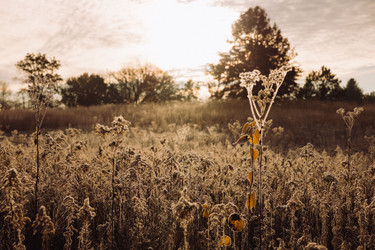Important Steps to Protect Your Plants Through the Winter
Posted by Woodland Tools on 10th Jan 2023
As the winter season approaches, it's important to take steps to protect your plants from the cold weather. Proper watering is key to keeping your plants healthy through the winter and getting them ready for the spring season. Here are some tips for watering your plants in the winter:
1) Check the soil moisture regularly: It's important to monitor the moisture level of your soil, especially during the winter months when the air is dry and plants are dormant. Stick your finger about an inch into the soil to check for moisture. If the soil feels dry, it's time to water.
2) Water deeply: When you do water your plants, make sure to water them deeply. This will help the water reach the roots, where it's needed most. Avoid watering the leaves, as this can encourage fungal growth.
3) Water at the right time: The best time to water your plants is mid-day, when the air is warmer and the water has time to soak into the soil before the temps drop below 40 degrees. Avoid watering in the evening, as this can encourage fungal growth.
4) Use mulch: Mulch is a great way to help retain moisture in the soil and protect your plants from the cold. Apply a layer of mulch around the base of your plants to help keep the soil moist and the roots warm.
5) Protect tender plants: If you have tender plants that are prone to freezing, you'll need to take extra steps to protect them. Consider covering them with a layer of mulch, burlap, or frost cloth to help insulate them from the cold.
Indoor plants can add a touch of greenery to your home and improve indoor air quality, but they need special care during the winter months. The dry air and low light levels of winter can be tough on indoor plants, but with the right care, you can keep them healthy and thriving. Here are some tips for caring for indoor plants in the winter:
1) Increase humidity: Indoor air can be very dry in the winter, which can be tough on plants. To increase humidity, try misting your plants with water or setting a humidifier nearby. You can also place a tray of water near your plants to help increase the humidity.
2) Provide adequate light: Indoor plants need sunlight to grow and thrive, but in the winter, the days are shorter and the sunlight is weaker. Make sure your plants are getting enough light by placing them near a sunny window or using grow lights.
3) Avoid over-watering: It's important to water your plants regularly, but be careful not to over-water them. Over-watering can lead to root rot and other problems. Stick your finger in the soil to check for moisture, and only water when the soil feels dry.
4) Fertilize sparingly: Indoor plants typically don't need as much fertilization in the winter, as they are dormant. If you do fertilize, use a balanced fertilize and apply it sparingly, as too much fertilizer can burn the roots.
By following these tips, you can help keep your outdoor and indoor plants healthy and thriving through the winter and get them ready for the spring season. Happy gardening!

